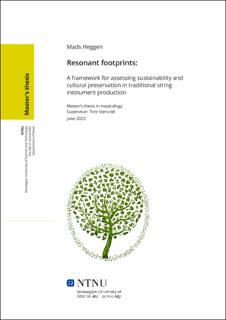| dc.contributor.advisor | Størvold, Tore | |
| dc.contributor.author | Heggen, Mads | |
| dc.date.accessioned | 2023-09-06T17:19:36Z | |
| dc.date.available | 2023-09-06T17:19:36Z | |
| dc.date.issued | 2023 | |
| dc.identifier | no.ntnu:inspera:145107239:23012682 | |
| dc.identifier.uri | https://hdl.handle.net/11250/3087810 | |
| dc.description.abstract | Denne oppgaven undersøker bærekraft i musikkindustrien, med fokus på produksjon av musikkinstrumenter fra strykerfamilien. Ved å ta i bruk en tverrfaglig tilnærming, som integrerer miljømessige, sosiale og økonomiske perspektiver, undersøkes miljøpåvirkningen av instrumentproduksjonen samt strategier for å fremme bærekraft i industrien. Oppgaven foreslår et rammeverk, som kan brukes til å vurdere bærekraft i produksjonen av tradisjonelle strykeinstrumenter. Rammeverket fremhever viktigheten av samarbeid mellom interessenter, åpenhet i datainnsamlingen og integrering av flere bærekraftshensyn. Oppgaven understreker behovet for kontinuerlig forskning, innovasjon og utdanning, for å fremme positiv endring i bransjen. Funnene i denne oppgaven bidrar til de voksende feltene økomusikkvitenskap og økoorganologi, ved å gi innsikt i kompleksiteten bærekraft og miljøspørsmål kan medføre i musikkindustrien og andre kulturelle, tradisjonspregede bransjer. Ved å vurdere de miljømessige, sosiale og økonomiske dimensjonene i instrumentproduksjon, har oppgaven som mål å gjøre det lettere å treffe gode beslutninger og fremme en mer bærekraftig og ansvarlig tilnærming til musikk.
Nøkkelord: økomusikologi, økomusikkvitenskap, økoorganologi, bærekraft, musikkindustri, musikkinstrumenter, kulturell bærekraft, musikk, miljøhumaniora | |
| dc.description.abstract | This thesis examines the sustainability of the music industry with a specific focus on the production of musical instruments, particularly those in the violin family. By adopting an interdisciplinary approach that integrates environmental, social and economic perspectives, this research aims to understand the environmental impact of instrument production and explore strategies for promoting sustainability in the industry. Throughout the research, a framework for assessing sustainability in the music industry is proposed. This framework highlights the importance of stakeholder collaboration, transparency in data collection and the integration of multiple sustainability considerations. It emphasises the need for continuous research, innovation and education to drive positive change in the industry. The findings of this thesis contribute to the growing field of ecomusicology and ecoorganology by providing insights into the complexities of sustainability in the music industry and other cultural and/or traditional industries. By considering the environmental, social and economic dimensions of instrument production, this research aims to make it easier to make decisions and promote a more sustainable and responsible approach to music-making.
Keywords: ecomusicology, ecoorganology, sustainability, music industry, musical instruments, cultural sustainability, music | |
| dc.language | eng | |
| dc.publisher | NTNU | |
| dc.title | Resonant footprints: A framework for assessing sustainability and cultural preservation in traditional string instrument production | |
| dc.type | Master thesis | |
